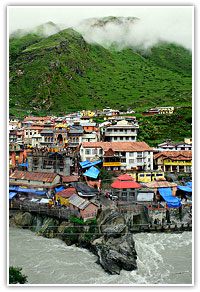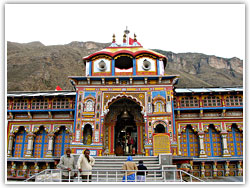|
|
Badrinath, Uttaranchal
.............................................................................................................................................................................. |
|
|
|
Information about Badrinath
The Char Dham consists of the four major shrines
of Gangotri, Yamunotri, Kedarnath and Badrinath.
Badrinath is one of the holiest pilgrimage shrine
in the Garhwal Himalayas among all these shrines.
Badrinath is situated amidst the magnificent
background of the Neelkanth mountains in the twin
mountain ranges of Nar and Narayan, along the left
banks of the Alaknanda river. According to the
Hindu Shastras, no pilgrimage is complete unless
one visit Badrinath, the abode of Vishnu. Along
with Rameshwaram, Dwarka and Puri it is one of the
four holiest places in India and it is a living
faith with every Hindu to visit the shrine of
Badrinath once in a lifetime. Once, this place was
carpeted with badris or wild berries and hance
also known as Badrivan. The word Badri is derived
from the wild fruit that Vishnu was said to have
lived on when he did penance at Badrivan, the area
which covers all five |
 |
|
|
important temples including Kedarnath. The Badrinath
temple is dedicated to Lord Vishnu. This temple remains
closed during the winter season and is open from May to
November. There are numerous resthouses and dharamshalas
in Badrinath to cater the pilgrims and travellers. In
summers, the temperature is very cool during the day and
cold at night and in winters, it is covered by snow. The
best season to visit Badrinath is from May to November.
Hindi, Garhwali and English are the main languages which
are spoken here.
History of Badrinath
The shrine of Badrinath is full of legends from
mythology. Its sanctity is mentioned in the various
ancient scriptures. According to the Skanda Purana,
there are many shrines on earth, heaven and hell, but,
there has been none shrine equal to Badrinath and nor
will be. According to the legend, when the Ganga was
requested to descend on the earth to help the suffering
humanity, the earth was unable to withstand the force of
its descent. So, the Ganga was split into twelve holy
channels and Alaknanda was one of them which later
became the abode of Lord Vishnu or Badrinath.
Tourist Attractions in
Badrinath
The main tourist attraction in Badrinath is the
Badrinath Temple. Besides this temple, the Tapt Kund,
Neelkanth, Brahma Kapal and Sheshnetra are the other
worth visiting places. |
|
|
|
Badrinath Temple
The Badrinath Temple is dedicated to Lord Vishnu.
This temple is located on the banks of the
Alaknanda river and belongs to the vedic times.
This temple is believed to have been built by the
Adi Guru Shankaracharya, the 8th century
philosopher and saint and has been renovated
several times. The temple is built in the form of
a cone with a small cupola of a gilt bull and
spire. The temple is small and brightly painted in
green, blue, pink, yellow, white silver and red.
Its colourful 'Singh |
 |
|
|
Dwara'
gives it a new and modern look. The temple is divided
into three parts-the garbha griha or sanctum sanctorum;
the darshan mandap, where rituals are conducted and
sabha mandap, where devotees assemble. This complex has
15 idols. The main idol is the one metre high image of
Badrinath, finely sculpted in black stone. It represents
the Lord Vishnu seated in a meditation pose.
Neelkanth
Neelkanth is a pyramidal shaped snowy peak towering
above the Badrinath Temple. This peak is also known as
the Garhwal Queen.
Brahma Kapal
Brahma Kapal is a flat platform on the bank of the
Alaknanda river where Hindus perform propitating rites
for their deceased ancestors.
Sheshnetra
Sheshnetra is a boulder that has the impression of the
legendary serpent, known as Sheshnag's eye.
Tapt Kund
After worshipping in the temple, it is customary to
bathe in the Tapt Kund, a cistern of hot water which is
situated at a short distance below the temple. This is
fed by a hot sulphurous spring in which Agni resides by
the kind permission of Lord Vishnu.
Excursion from Badrinath
Mata Murti Temple
Mata Murti Temple is situated on the right banks of the
Alaknanda river. This temple is dedicated to the mother
of Sri Badrinathji.
Mana Village
Mana Village is inhabited by Indo-Mongolian tribe and
considered to be the last Indian village before Tibet.
On this route, the Vyas Gufa, the rock cave of saint Ved
Vyas, Bhim Pul, a natural bridge over the Saraswati
river and Vasundhara Falls, a 122 meters high waterfall
are situated which form an important part of the
pilgrimage to Badrinath.
Satopanth
A three cornered lake with a circumference of about 1
km., is situated at a height of 4402 meters above sea
level. It is named after the Hindu triad-Brahma, Vishnu
and Mahesh, who are believed to occupy one corner of the
lake. The trek is hazardous with dramatic landscapes.
Chamoli
Chamoli is the tiny mountain retreat from Gopeshwar to
Badrinath highway. This retreat attracts visitors for
its verdant landscapes and fresh mountain air.
How to reach Badrinath
By Air:
The nearest airport is Jolly Grant in Dehradun, about
317 kms. from Badrinath.
By Rail:
The nearest railway station is located in Rishikesh,
about 300 kms.
By Road:
Badrinath is well connected by road to Rishikesh,
Dehradun, Kotdwar, Haridwar and other important hill
stations of Garhwal and Kumaon region. |
|